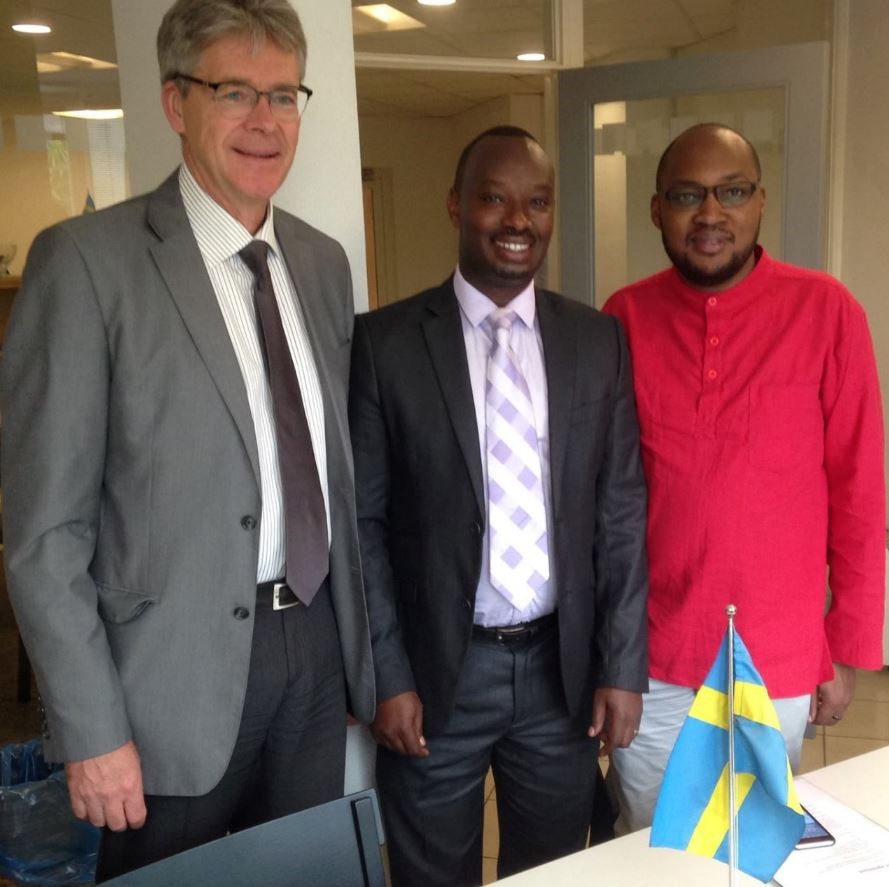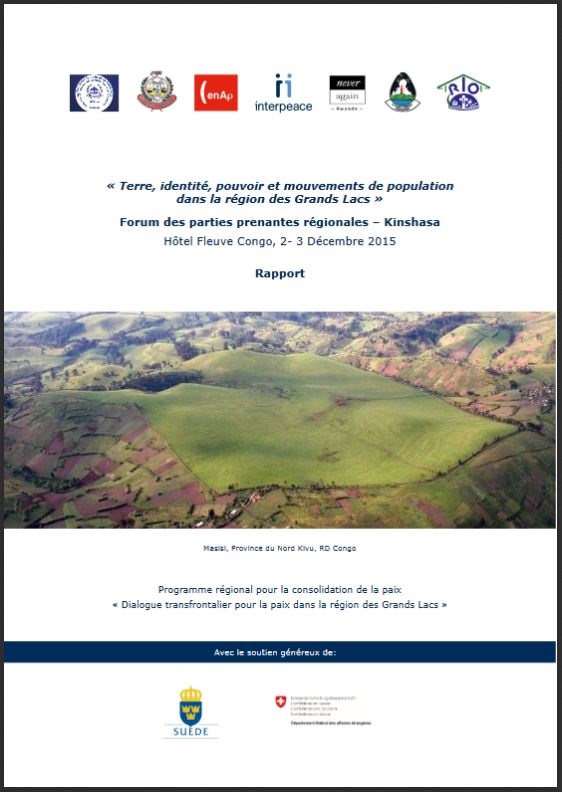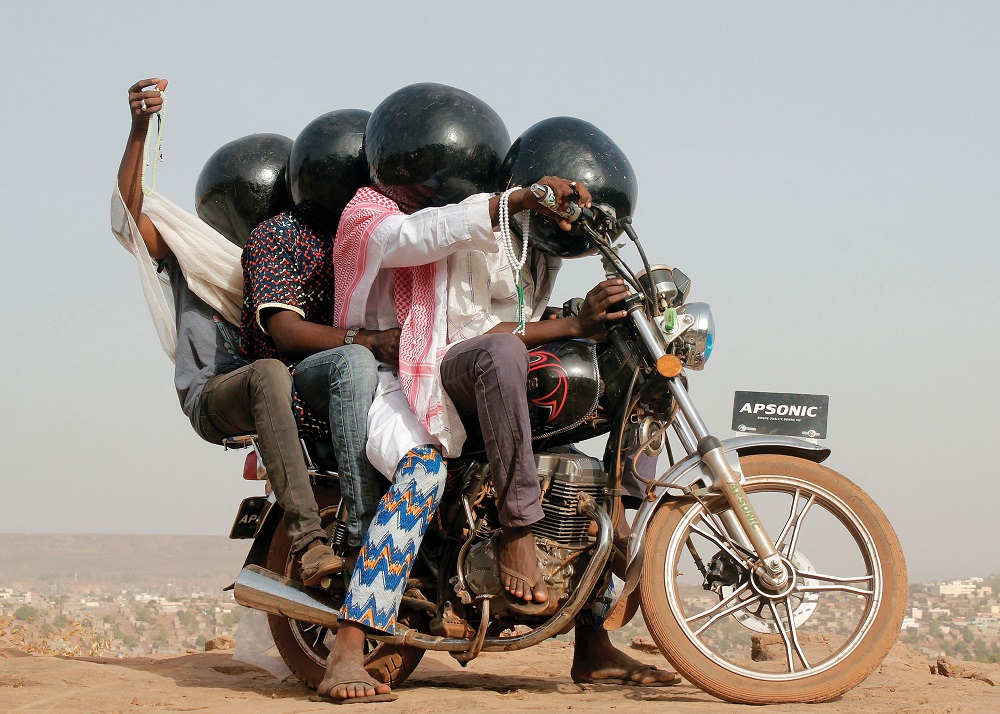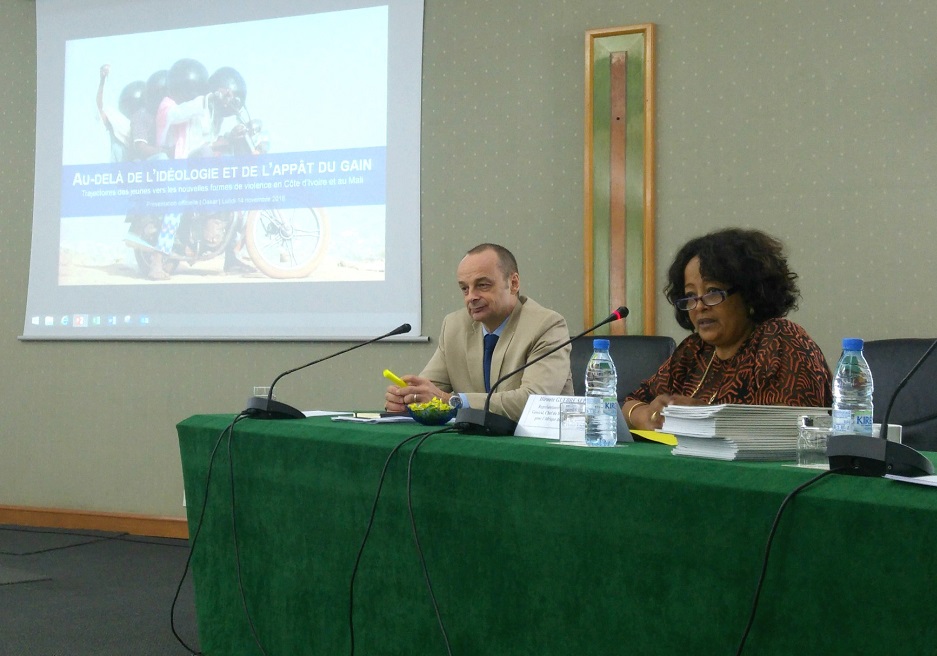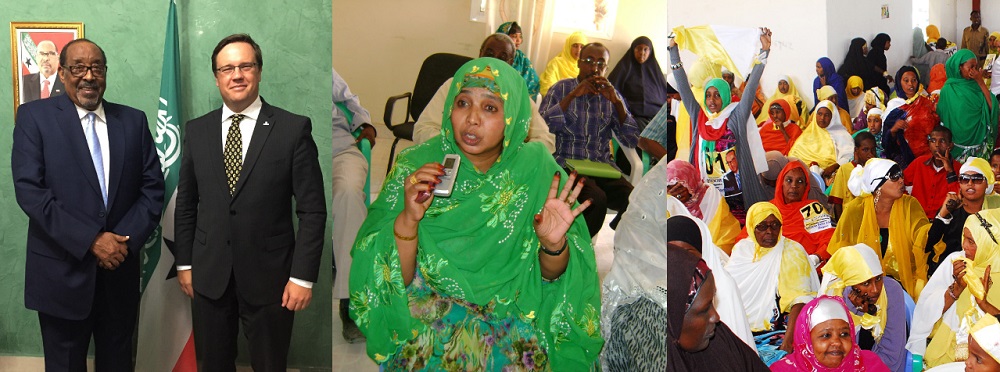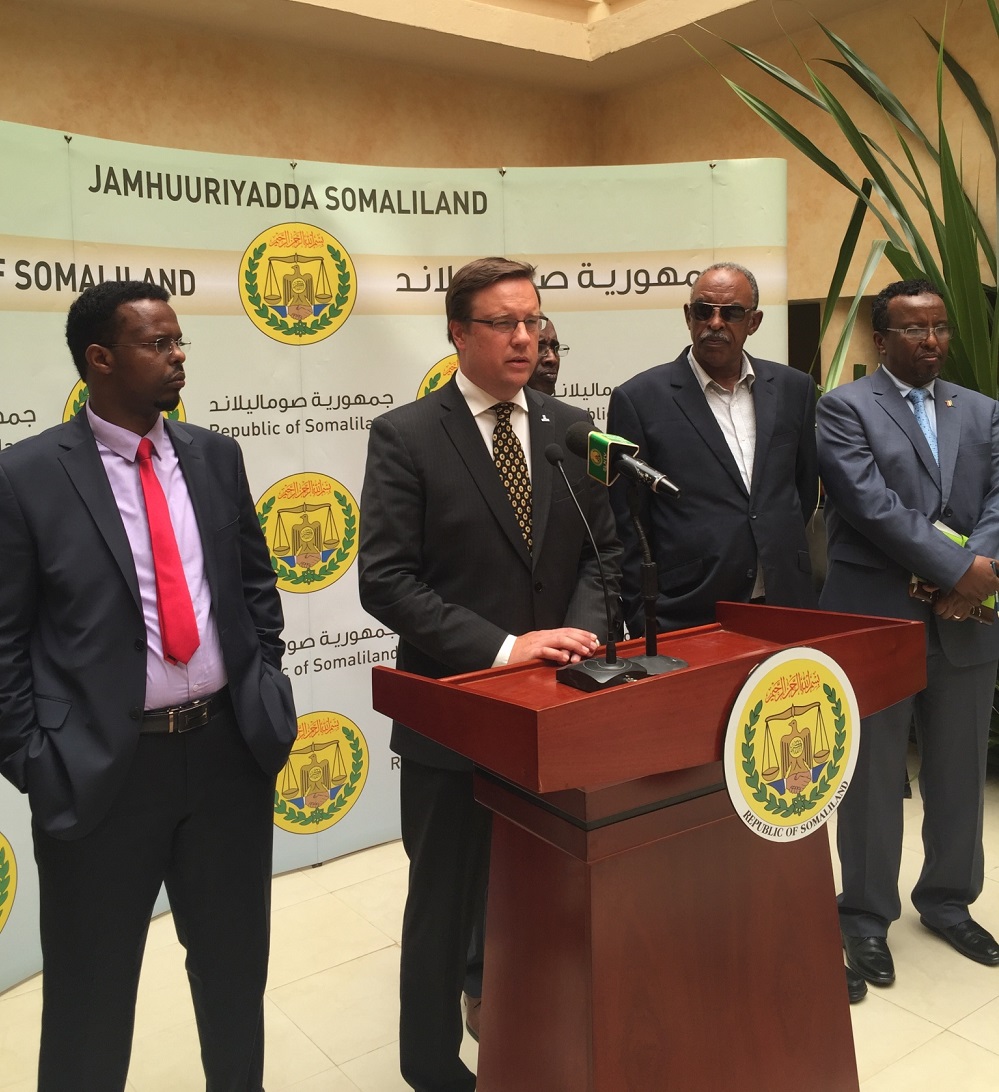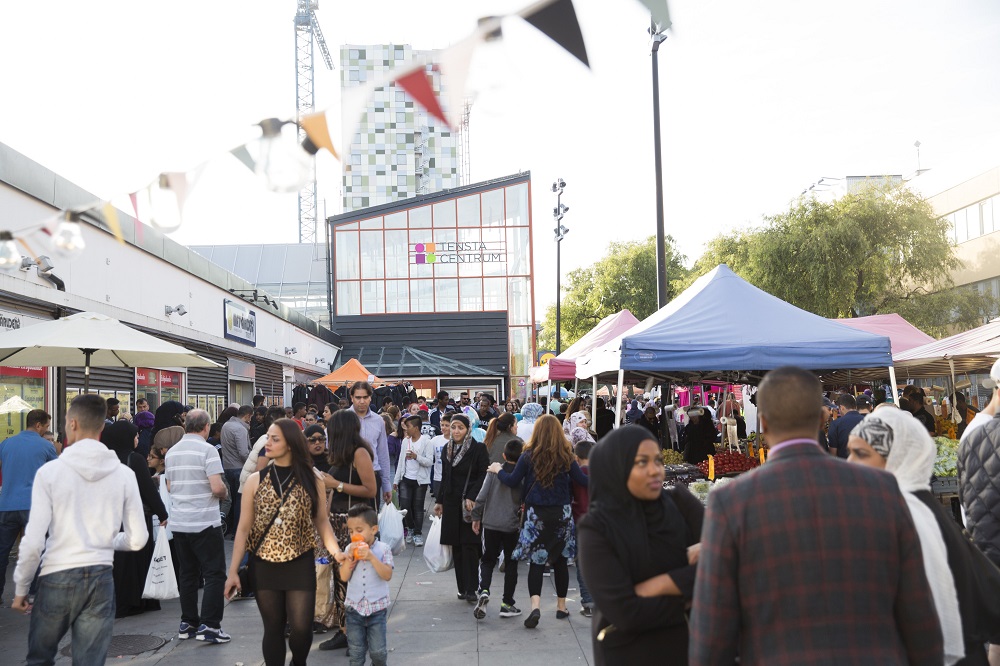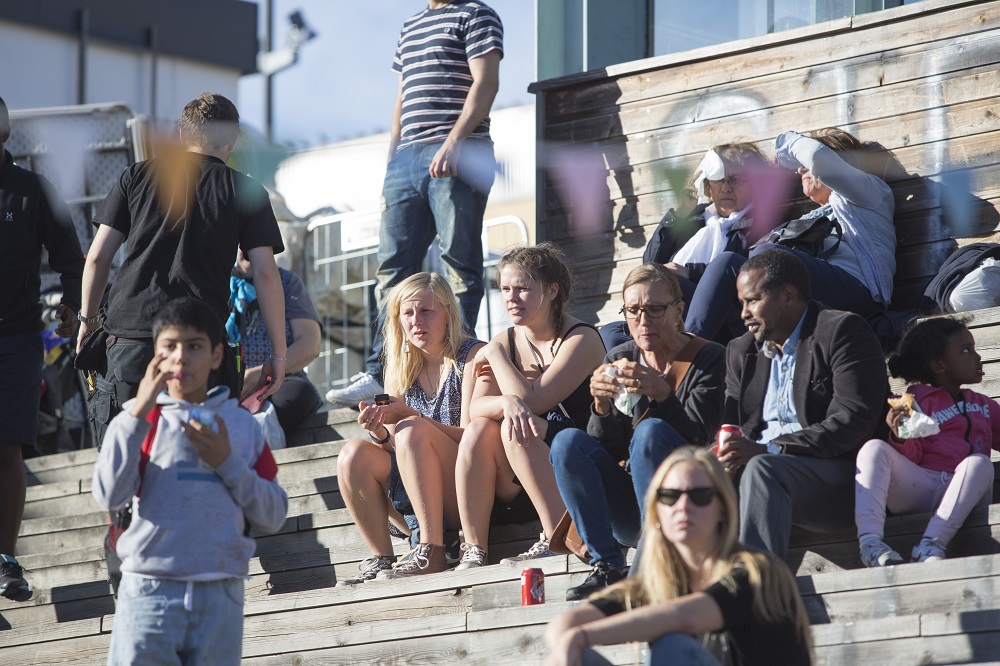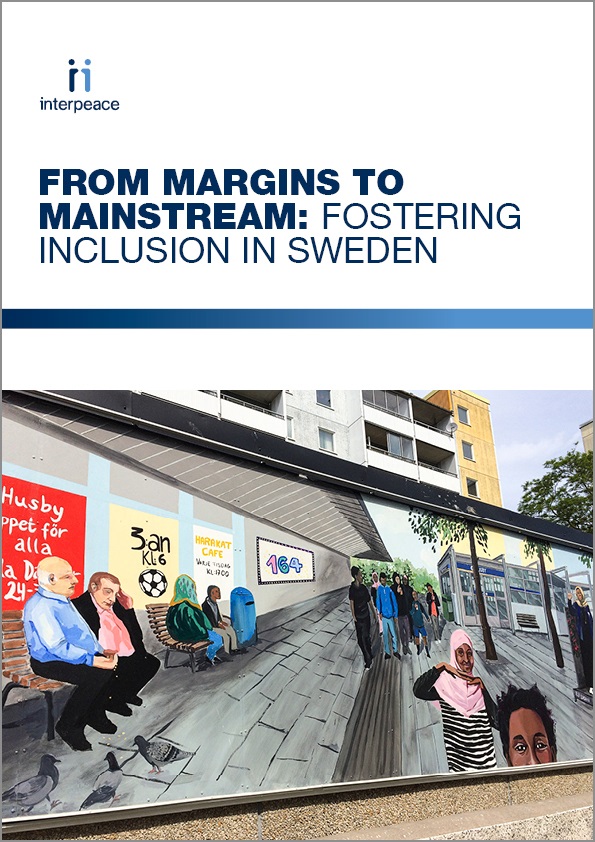The Government of Sweden has committed to supporting Interpeace’s Cross-border dialogue for peace in the Great Lakes for a second four-year phase Between 2017 - 2020. This was in response to a strong request by people from all walks of life in the region for a continuation of the cross-border dialogue initiatives that fosters more sustainable regional peace.
An agreement for this support was signed on 30 November 2016 in Kigali, Rwanda, by Mr Mikael Boström, Counsellor and Head of Development Cooperation and Interpeace’s Regional Director for Eastern and Central Africa (ECA), Mr Jean Paul Mugiraneza.
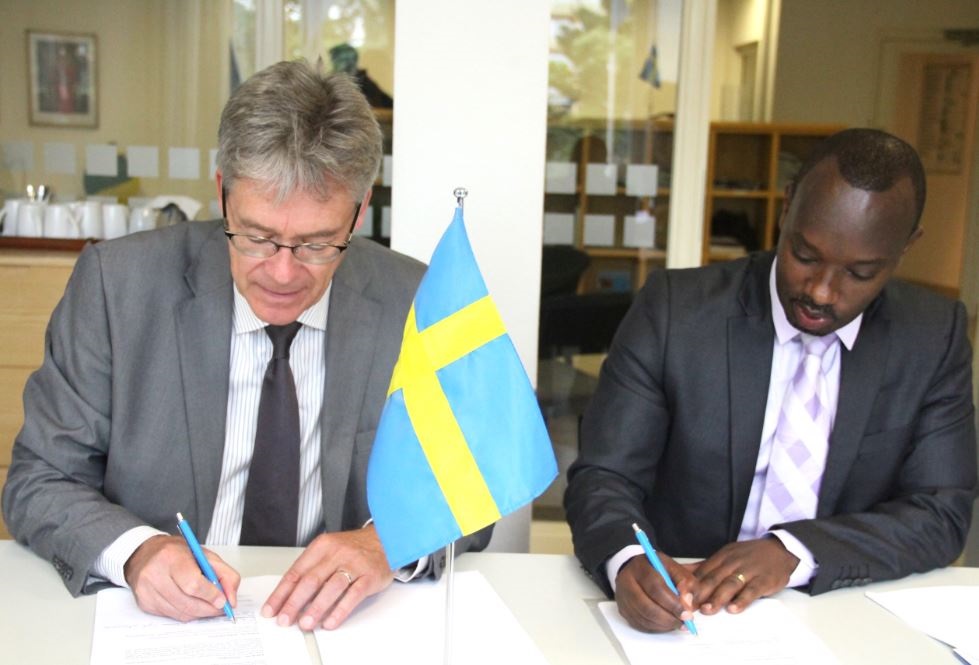
Mr Mikael Boström, Counsellor and Head of Development Cooperation and Interpeace’s Regional Director for Eastern and Central Africa (ECA), Mr Jean Paul Mugiraneza. Photo credit: Never Again Rwanda
The programme first launched in 2013, with support from Sweden and the Swiss Development Cooperation. It is designed and implemented jointly by Interpeace and its six partner organisations from the region: the Centre for Conflict Alert and Prevention (CENAP) in Burundi; Never Again Rwanda (NAR) in Rwanda; and in the DRC’s North and South Kivu provinces, Action pour la Paix et la Concorde (APC), Pole Institute, Centre d’Etudes Juridiques Appliquées (CEJA) and Réseau d’Innovation Organisationnelle (RIO).
The programme seeks to foster cross-border dialogue among local communities, civil society organisations, persons in key decision making positions or in regional institutions in the three countries. Its ultimate goal, in the long run, is to foster a common understanding that will allow the citizens and all other stakeholders to act together as change agents for peace in the region, which has suffered numerous conflicts with devastating cross-border implications since the late 1950s.
Interpeace and the partner organisations seek to do this through facilitating an open and inclusive dialogue on taboo issues that continue to fuel regional conflict, and to bring out action-oriented solutions and policy influence. It hence seeks to minimise prevailing tensions, suspicion and mistrust among the peoples of the three bordering countries of Rwanda, Burundi and the Democratic Republic of Congo (DRC), which have impeded a collaborative cross-border effort for sustainable peace for decades.
“Sweden has been a strong partner and supporter of Interpeace’s work in the Great Lakes and elsewhere in the world,” Mr Mugiraneza said at the brief ceremony. “On behalf of Interpeace and partners, we are grateful for the generous support and proud of this partnership with the Government of Sweden, which will go a long way in the process of building lasting peace between communities in Rwanda, Burundi and the DRC.”
The signing ceremony was attended by Swedish Embassy staff, as well as programme staff from both Interpeace and some of its partner organisations.
For two hours on the evening of 17 November 2016, twenty students from the university’s School of International Development and Global Studies (SIDGS), members of the Congolese Diaspora and two policy experts gathered together at the University of Ottawa, Canada, to watch the film Touche pas à ma terre (“Do not touch my land.”)
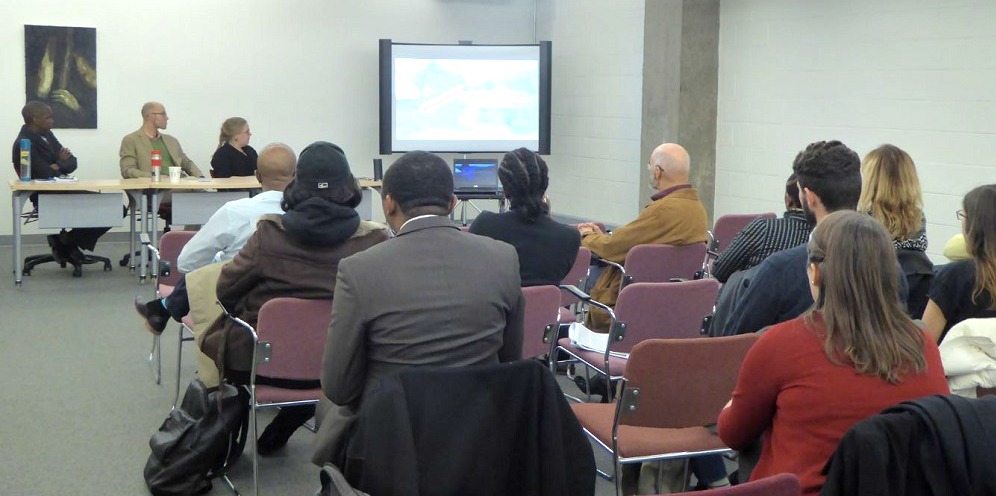
The audience at the University of Ottawa watches the film on land and conflict in the Great Lakes region. Photo credit: Kirsten Van Houten
The film is the audio-visual summary of a 2014 research on identity, population movements, land and conflict in the Great Lakes region, conducted by Interpeace and its six partner organizations. These partners are the Centre for Conflict Alert and Prevention (CENAP) in Burundi; Never Again Rwanda (NAR) in Rwanda; and four organizations in the eastern Democratic Republic of Congo (DRC): Action pour la Paix et la Concorde (APC), Pole Institute, Centre d’Etudes Juridiques Appliquées (CEJA) and Réseau d’Innovation Organisationnelle (RIO).
For much of the past six decades, the Great Lakes region has experienced intermittent armed conflict, often resulting in large population displacements and serious humanitarian crises in the region. Interpeace and its six partner organisations have in the course of the ‘Cross-border dialogue for peace in the Great Lakes programme’ conducted two research processes in which local populations from the three countries have asserted that identity, its manipulation and resulting stereotypes are a key driver of continued conflict. They have also emphasised that the interaction between identity and land constitutes a potent conflict factor, often triggered off by the quest of one specific group or the other wanting to access or control political and economic power.
In the three bordering countries of Rwanda, Burundi, and the DRC, these conflicts around identity and land have decidedly taken a cross-border dimension. People belonging to the same communities are found across borders, and population movement is another bridge that explains why a conflict in one of the three countries almost always spills over into the other two.
The film screening at the University of Ottawa was followed by a panel discussion moderated by Decky Kipuka Kabongi, a doctoral candidate in international development policy at Carleton University. The discussion focused on the capacity and role of local and international actors to address land conflict in the Great Lakes Region. Panellists included the well-known Professor and expert on land issues in the Great Lakes, Chris Huggins of the University of Ottawa School of International Development and Global Studies (SIDGS), as well as Maurice Dikaya and Kirsten Van Houten, both Ph.D candidates at SIDGS.
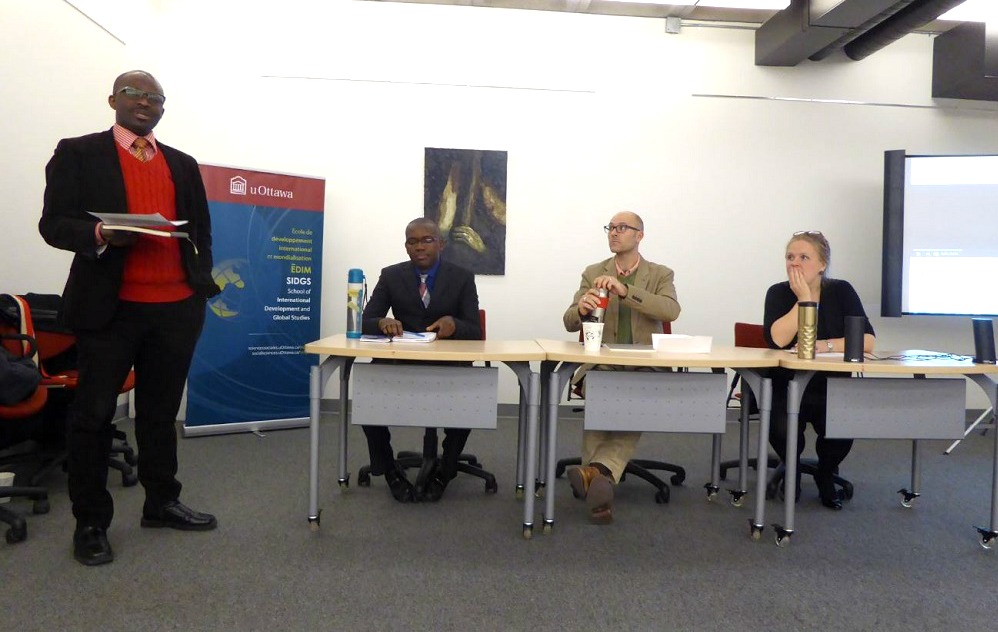
Decky Kipuka Kabongi moderates a panel discussion following the film screening. Photo credit: Kirsten Van Houten
All the three panellists provided contributions based on their research in the region. Mr Dikaya, a Congolese national, discussed forestry projects facilitated by the World Wildlife Fund for Nature (WWF) to help protect the land in the DRC and the role of the Mwamis (traditional leaders). On his part, Professor Huggins discussed the regional intricacies of land conflict in the region, while Ms Van Houten discussed the role of local civil society organisations in the resolution of land conflicts.
After the end of the panel discussion and presentations, audience members continued the conversation in extensive informal discussion over refreshments.
This screening is one example of the various national and international platforms that the programme uses to disseminate the views of grassroots populations on the obstacles and possible solutions to these recurrent conflicts. These platforms seek to facilitate a wider discussion on the national and international level, with the objective of encouraging reflection and initiatives that contribute to sustainable peace in the region.
Other platforms focus on high level national and regional policy and decision makers. One example from March 2016 was a regional summit on peace education, held Nairobi by Interpeace in collaboration with the International Conference on the Great Lakes Region (ICGLR) and UNESCO. Delegates at the summit included senior officials from government ministries responsible for education, gender and youth; parliamentarians; leaders of provincial governments; and education practitioners from Rwanda, Burundi, the DRC and Uganda.
Download the report on land, identity, population movements and conflicts in the Great Lakes region here (in French, English coming soon)
“Being forgotten, marginalized, not considered… that’s what generates violence.” Youth from Bouaké, Côte d’Ivoire.
Over the past few years, the Sahel region has faced rising levels of violence. Since 2012, Mali has been greatly impacted by the reactivation of diverse armed groups, who claim to be inspired by a jihadist ideology. In Côte d’Ivoire, new forms of urban violence have started to emerge, despite the end of the country’s armed conflict. To cope with these crises, Interpeace’s Regional Office for West Africa, with its local partners IMRAP and Indigo Côte d’Ivoire, conducted participatory research to understand the trajectories of young people towards new forms of violence and more specifically the role of education in these dynamics. Over the course of seven months, with the support of UNICEF, the researchers engaged with 741 people from a range of communities in Côte d’Ivoire and Mali.
There is growing international interest and scrutiny of young people’s engagement in new forms of violence. This phenomenon is generally analyzed through lenses of radicalization and violent extremism. As the international community desperately seeks to eradicate it, the factors often described as “structural and root causes” need to be revisited. It is widely believed that unemployment and religious ideologies are pivotal factors that contribute to radicalization and violent extremism in West Africa, but research findings show that these elements are, in fact, secondary. Contrary to common wisdom, young people do not engage in violent activities for negative reasons - against something or for violence itself. Rather, they perceive their engagement as constructive. Elements, such as young people's need to find their place in society, to be recognized and valued in their communities are of paramount importance in explaining their engagement in violence.
“When youth doesn’t recognize itself in society’s values, it looks for landmarks elsewhere”. High level civil servant, Bamako, Mali.
Similar to research conducted in Latin America, dynamics that push young people to join or remain in armed groups are often related to identity, opportunities for social mobility and the security of belonging that comes from being a part of a group. As a young man in the study described: “Someone who only knows how to use weapons. You dump him into the streets, what is he to become?” The research therefore identified a phenomenon of “professionalization of violence,” which describes how young people use violence as a way to gain capital, but more significantly, how they accrue social acceptance and value, through a positive recognition of the violence they perpetrate.
The study also identified that the majority of the population in both countries believes that an educational crisis and a crisis of authority are at the heart of young people's path towards violence. It is widely recognized that family, school and the community are unable to provide young people with the guidance they need. As an older man explained: “We simply raise our children instead of educating them. Because we are more worried about the food and clothes of our children, than of their education.” Therefore, for youth, joining violent groups offers an opportunity to climb the social ladder and to build their identity and self-esteem.
The report “Beyond Ideology & Greed: Trajectories of Young People towards New Forms of Violence in Côte d’Ivoire and Mali,” has been launched in Abidjan on October 26, Bamako on November 2 and in Dakar on November 12. For the regional launch in Dakar, Interpeace, IMRAP and Indigo, were joined by high-level UN officials from diverse agencies, including the DSRSG for the Sahel and West African region, Ms. Hiroute Guebre Sellassie. In her closing remarks, she stated: that the study “exhorts all of us to humility and to challenge received wisdom when trying to understand such complex social issues”.
To learn more about this study and read the recommendations at the social, economic and educational levels, please do refer to the following links:
Full report (in French) here.
Executive summary (in French) here.
Executive summary (in English) here.
Watch documentary films with the findings of this research in French and English.
Interpeace has announced that the first-ever London Peace Talks will take place on Thursday 3rd November 2016. Now in its fourth year, The Peace Talks is a global initiative which aims to inspire reflection on how we can all work together to promote peaceful and inclusive societies, both at home and abroad. The Peace Talks were co-founded by the United Nations Office at Geneva, Interpeace and the Geneva Peacebuilding Platform.
People will be able to tune into the live stream on: peacetalks.net.
The Peace Talks, which will be held at the iconic London City Hall from 6:30pm onwards, builds on the idea that everyone can play a part in building peace in society. The theme is around “Building Bridges” and speakers from a wide range of professional and personal backgrounds will share their timely stories and practical solutions for resolving conflict.
The following speakers will deliver inspiring 8-minute talks on how they are working to promote more inclusive societies, both in the UK and abroad:
- Raed al Saleh: Head of the Syrian Civil Defence (also known as The White Helmets), whose volunteer rescue workers have saved over 62,000 lives and earned them the 2016 Right Livelihood Award and the nomination for the 2016 Nobel Peace.
- Ruth Ibegbuna: Ashoka UK Fellow and Founder of RECLAIM, a Manchester-based award-winning social action and youth leadership programme.
- Fatima Zaman: Young leader at the Kofi Annan Foundation’s program Extremely Together and expert on countering violent extremism.
- Noa Gafni Slaney: Digital strategist, Fellow of Social Innovation at the University of Cambridge and CEO of Impact Squared.
- Peter Adams: Director of the St Mary’s Centre for Peace and Reconciliation in Luton.
- Rehana Faisal: Community activist and chair of Luton An Nisa Trust, LANTern, a grassroots movement which seeks to empower Muslim women through engagement in social issues.
- Maran Turner: Executive Director of Freedom Now, and award-winning human rights lawyer for her representation of Václav Havel and Nobel Peace Prize Laureate Desmond Tutu.
Radio DJ and broadcaster Lliana Bird, who co-founded Help Refugees, the biggest provider of aid to Calais and Dunkirk, will be hosting the event.
The London Peace Talks are organised by Interpeace in partnership with Ben & Jerry’s, Mirabaud and the Embassy of Switzerland in the United Kingdom.

In all its peacebuilding programmes around the world, Interpeace applies a Track 6 approach that establishes connections between local communities, civil society, government and the international community. This approach combines peacebuilding at the Track 1, Track 2 and Track 3 levels, ensuring that high-level policies reflect local realities and benefit from local knowledge. This contributes to the legitimacy and sustainability of the policies developed and adopted.
Interpeace’s work in Somaliland offers a clear example of the Track 6 approach. The organization has since 2005 worked closely with its Somaliland partner, the Academy for Peace and Development (APD), to support Somaliland’s democratic process. This partnership has ensured the placement of local populations and civil society at the centre of peacebuilding efforts, enriching Somaliland’s democratization process by providing spaces for dialogue, reconciliation, and ultimately, state building.
On the high level spectrum of the Track 6 approach, Interpeace engages policy and decision makers at the national and international level. A recent example was when on 24 August 2016, President Ahmed Mohammed Mohamud Silanyo of Somaliland held audience with an Interpeace delegation led by Director-General Scott Weber, accompanied by Interpeace’s Regional Director for Eastern and Central Africa (ECA), Jean Paul Mugiraneza; Mohamed Farah, the Director of Interpeace’s partner organization, APD; and Interpeace’s Democratization Advisor Khadar Guleid.
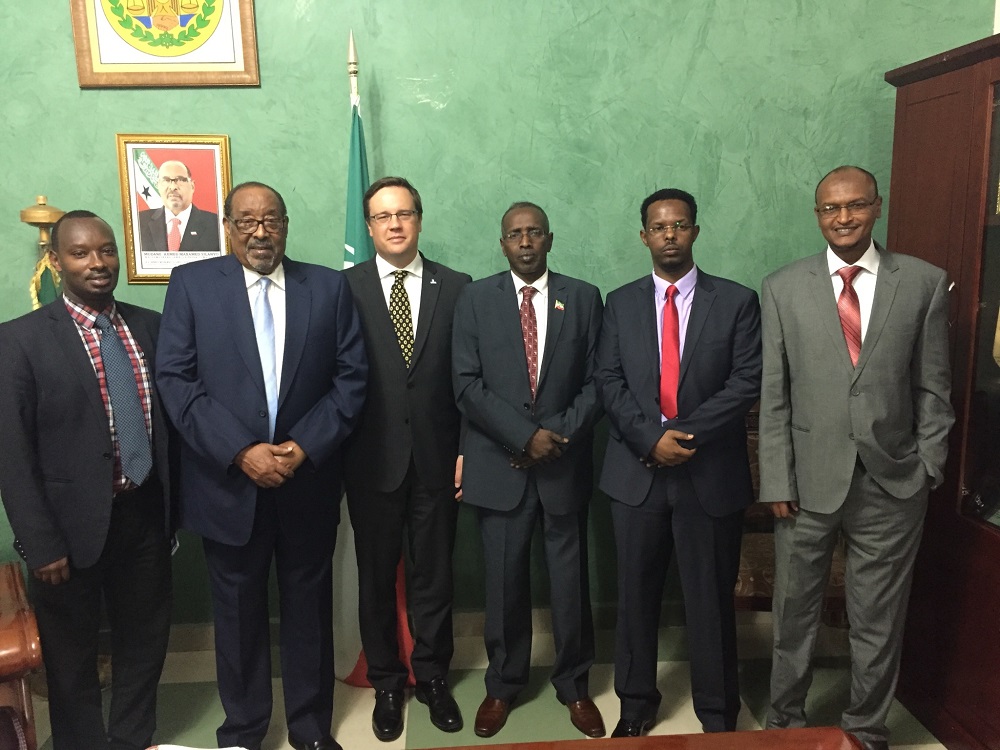
President Ahmed Mohammed Mohamud Silanyo of Somaliland with the Interpeace delegation led by Director-General Scott Weber. Photo credit: Interpeace
During the meeting, President Silanyo appreciated Interpeace’s work in Somaliland over the last 20 years.
“We view you [Interpeace] as one of our closest and most understanding allies, and are deeply grateful for the support and assistance you have provided at such crucial moments as during the 2010 election, and again today as we approach another landmark election. We very much value the role you play in Somaliland, which we feel is crucial to ensuring peace, harmony and prosperity to our people,” President Silanyo said.
While discussing the positive transformations that have taken place in Somaliland, the President also took the chance to articulate the work that remains to be done: strengthening the democratization process, revising the Constitution and preventing border conflicts. Efforts are now centred on the preparations for the presidential elections, which will be held on March 2017. The voter registration process has been underway since the Somaliland National Electoral Commission (NEC) launched a biometric voter registration process in January 2016, with technical support from Interpeace and APD. Interpeace and its partner organizations continue to work with the community, civil society and the Federal Government to ensure that the elections are just, free and fair.
Mr. Weber later met with the Speaker of Somaliland’s Parliament, the Minister of Planning, the Minister of State for Security and the Deputy Minister of Foreign Affairs.
Marginalization and exclusion have caused an increase of violent incidents in Europe in the past decade. Issues associated with socio-economic inequalities and lack of opportunities have resulted in social protests and riots. Following a series of social unrests in 2012 and 2013 in Sweden, Interpeace initiated a participatory research initiative in Tensta, a suburb of Stockholm, to better understand the challenges facing marginalized communities and identify practical ways to overcome exclusion. In 2015, Interpeace launched the second phase of its programme, engaging over 200 stakeholders across the country in a dialogue about the opportunities to build a more inclusive Swedish society. The project was carried out in four areas of Sweden: Tensta in Stockholm and Rosengård in Malmö, well known marginalized neighborhoods in the country, as well as Luleå in the north and Älvsjö in the Stockholm area, two areas that are representative of the national average in terms of demographics and socioeconomic standards.
"People shouldn't be focusing on their differences but on what they have in common. We are all humans and have much more in common than what we think." Youth from Tensta, Sweden
Building on the findings of its work, Interpeace is launching the report “From Margins to Mainstream: Fostering Inclusion in Sweden”. Our research reveals three main aspects that emerged as cornerstones of inclusion, according to the participants consulted in the research: acceptance, dignity and diversity. Promoting these three aspects at all levels of society will help foster greater inclusion and create better opportunities for everyone to prosper. The report highlights a number of recommendations that can be taken up by the various stakeholders working on this topic, including institutions of the state, the private sector, municipalities and civil society. The report also discusses how tackling barriers of exclusion in all aspects of life, including the education and employment systems, are critical to laying the foundations for greater inclusion.
"The only way to fail is to not do anything." A teenager from Älvsjö, Sweden
Sweden, as several countries in Europe, has recently adopted tougher asylum legislations. The large influx of migrants and refugees to the continent in the last two years captured the attention of the media and has served to reinforced negative perceptions and stereotypes of immigrants among the public, reviving and polarizing the debate on the effectiveness of integration policies and practices.
Today, Sweden has the opportunity to construct the foundation for a society that is rich in empathy and culture. Failing to take these steps, the country will see poorly integrated immigrant communities continue to grow in size and scope, and social exclusion will increase accordingly. The 2030 Agenda for Sustainable Development, and in particular Goal 16 on inclusive and peaceful societies presents an opportunity for Sweden to implement a vision for inclusion that is meaningful in tackling the challenges of inclusion in highly developed settings and to inspire other countries.
Read the full report here - From Margins to Mainstream: Fostering Inclusion in Sweden. The Swedish version of the report will be available shortly.
